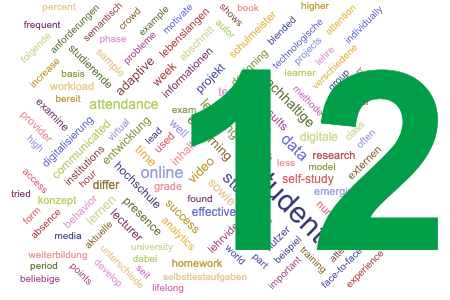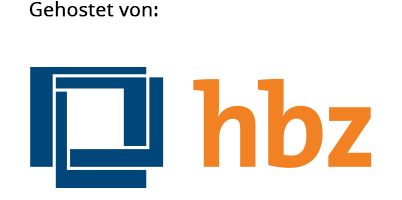12. Issue June 2017

- Summary
- Initially, e-learning has been seen as a means to replace face-to-face teaching by digital media in order to increase learning success at lower cost. Meanwhile, blended learning environments seem a more promising approach. Issue 12 presents contributions to four hot topics in the e-learning domain: blended learning, new technological approaches for e-learning, learning analytics, and new demands on educational programs.
- Zusammenfassung
- Anfänglich sollte e-learning Präsenzlehre durch Lehren mit digitalen Medien ersetzen, um den Lernerfolg bei geringeren Kosten zu erhöhen. Inzwischen scheinen blendend-learning Umgebungen ein erfolgsversprechenderer Ansatz darzustellen. Die Ausgabe präsentiert interessante Beiträge zu vier aktuellen Themen im Gebiet des e-learning: Blendend Learning, neue technologische Ansätze für e-Learning, Learning Analytics und neue Ansprüche an Studiengänge.
Editorial
Initially, e-learning has been seen as a means to replace face-to-face teaching by digital media and new technologies in order to increase learning success at lower cost. In the meantime, blended learning environments seem to be a more promising approach.
This issue presents interesting contributions to four hot topics in the e-learning domain: blended learning, new technological approaches for e-learning, learning analytics and new demands on educational programs.
Blended Learning
Rolf Schulmeister examines in his article “Presence and Self-Study in Blended Learning” why comparisons show online courses to be inferior to blended learning courses. He shows that the face-to-face component of blended learning environments has a positive effect on learning success, exceeding the impact of self-study. In conclusion, Schulmeister rejects the increase of teaching with media at the expense of presence.
Julia Lutz describes in her project report “Blended Learning in der Musiklehrerbildung. Erfahrungen und Perspektiven am Beispiel eines Praxisprojekts“ first results of the evaluation of an approach, which links online e-learning offers with classroom sessions to support teams of students and school teachers in planning, implementing and evaluating a teaching unit. Early results emphasize the importance of networking and remote collaboration between training phases.
Daniel Sitzmann introduces in his dissertation “Rahmenwerk für zielgruppenorientiertes Blended E-Learning im MINT-Bereich im Kontext des Lebenslangen Lernens“ a framework for target group-oriented blended e-learning in STEM disciplines in the context of Lifelong Learning. It addresses the requirements for such an e-learning application in the STEM sector for diverse target groups as well as functional requirements of the STEM sector and from lifelong learning.
Gerhard Stitz examines in his dissertation “Multiplikatorische Fortbildungen mit E-Learning-Unterstützung“ how multiplier training can be supported by e-learning. To this end, the thesis presents a blended learning concept for multiplier training, a process model, and a semantic map of relevant e-learning tools.
New technological approaches for e-learning
Ingolf Waßmann, Martin Müller and Djamshid Tavangarian introduce in their article “J-Quizmaker” a web application that helps to turn video segments into resources that can be enriched by self-test tasks with defined follow-up activities. The result supports semantic processing of video material in two ways: it enables adaptive learning by providing video content based on learner performance and knowledge as indicated by the self-tests and it makes information about semantic content of video segments available for further search and linking activities.
Begoña Gros, Kinshuk and Marcelo Maina (eds.) explore in the book “The Future of Ubiquitous Learning” emerging pedagogical perspectives based on the design of new learning spaces supported by digital technologies. Its collection of research covers foundations of emerging pedagogies, learning designs for emerging pedagogies and adaptive and personalized learning.
Anke Hanft et al. present in their book „ Organisation und Management von Weiterbildung und Lebenslangem Lernen an Hochschulen“ results of the scientific evaluation of the project „Organisation und Management der Universität Oldenburg“. Approaches for planning, development and organisational integration of continued education offers in a university are presented and analysed. Case studies examine challenges of sustainable implementation of continued education and lifelong learning at universities.
Based on empirical studies and literature analysis, Nina Kahnwald et al. describe in their book “Informelles Lernen Studierender mit Social Software unterstützen“ how universities may support student learning by social software.
Sue Gregory et al. (eds.) present in their book “Learning in Virtual Worlds: Research and Applications” an outline of the emerging trends and developments in the use of 3D virtual worlds for teaching and learning, including learner interaction with virtual worlds, communication modes and perceived presence, accessibility issues for elderly or disabled learners, enhancement of learner immersion, and best practices in the design and implementation of virtual world-based learning interventions.
George Veletsianos (ed.) provides in the book “Emergence and Innovation in Digital Learning: Foundations and Applications” a one-stop locale for work on emerging technologies and practices in online education. It is the intention to enable researchers and practitioners to conceptualize, critique, and enhance their understanding of the foundations and applications of new technologies.
Learning Analytics
In his article “The Spectrum of Learning Analytics” Gerd Kortemeyer provides a survey on two decades of research on learning analytics. He distinguishes two main perspectives as extremes of a spectrum: the transactional perspective focusing on improving learning success within a course and the institutional perspective focusing on improving success in a degree program. Finally, he identifies a combination of both extremes as a promising open issue.
New demands on educational programs
Frank Bensberg, Kai-Michael Griese and Andreas Schmidt describe in their project report “Digitalisierung der Arbeit vor dem Hintergrund der nachhaltigen Entwicklung“ an exploratory job advertisement analysis aiming at determining the relevance of concepts of sustainability and digitization in the labor market, and identifying which job profiles are in demand in this context. Results may inform players in the educational sector about coming demands impacting their programs.
Joerg M. Haake
Editor-in-Chief, eleed


